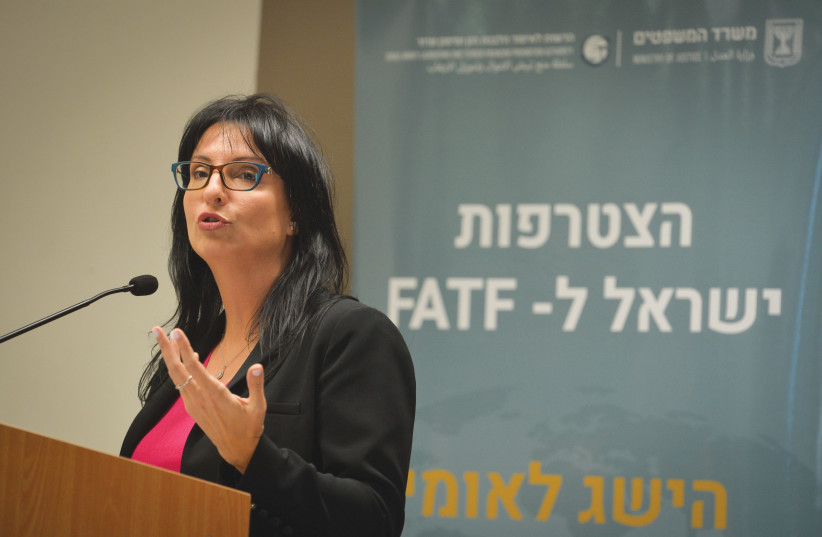A range of moves by the government have led to the seizure of NIS 103 million of Hamas terrorism funds, National Bureau for Counter Terror Financing of Israel official Sagi Volkovitz said at a government conference on Tuesday.
His agency is part of the Defense Ministry. Volkovitz gave complex examples of groups that would sell or deliver goods to Hamas in Gaza to get around banking regulations, while a seemingly disconnected Hamas office in a foreign country would pay for something in return that regulators would be hard-pressed to make a connection with.
The conference primarily highlighted the 20th anniversary and work of the Israel Money Laundering and Terror Financing Prohibition Authority (IMPA) headed by Shlomit Wagman, but it also featured officials from other agencies, including the police, the prosecution and the courts.
Wagman said the IMPA works with the police, the prosecution, tax agencies, but also “with the Mossad, the Shin Bet [Israel Security Agency] and other agencies in ways that I cannot specify,” to combat terrorist financing and money-laundering.
She said the IMPA helps intelligence agencies and law enforcement to be able to arrive at declaring certain groups as terrorist organizations by helping them connect Israel’s adversaries’ complex schemes and financial dots.
“Our joining the FATF [Financial Action Task Force] was noted as a difficulty for Iran,’’ as the Islamic Republic has tried, and failed to date, to get its name off the FATF global agency economic blacklist, she said.

The FATF is a global money-laundering and terrorism-financing watchdog.
She praised the country’s new economic crime-focused courts for their special expertise in money-laundering and terrorism-financing cases so that the government can seize illegal funds faster, where sometimes “there are billions at stake.”
Tel Aviv District Court Judge and head of the special Economic Crimes Courts Khaled Kabuv said the move to establish these specially focused courts started around three years ago after he and other judges were exposed at various conferences to the level of complexity in the field.
After he repeatedly heard and was shown that the special legal and factual expertise needed to handle terrorism-financing, money-laundering and legal disputes over new kinds of digital currency was far beyond the judges’ current capacity, he helped push to establish courts rooted in that expertise.
He said that with specially trained judges, cases that once could take more than a decade due to their complexity and the judge’s lack of familiarity with the intricate issues involved, now could be resolved in only two to three years.
Kabuv said there were heated debates about establishing courts and judges focused in these areas, and also about whether there should be separate units to deal with money-laundering and digital issues versus corporate and securities legal disputes.
In the end though, Kabuv said he helped convince key decision-makers that one economic-focused court unit was the right way to go. He added that they had made a lot of progress and that in a few more years, the vision would be fully realized.
Speaking by video, FATF president Dr. Marcus Pleyer said, “Money laundering poses a threat not only to our financial systems, but also to the rule of law.”
He emphasized the FATF’s new focus to combat the, “financing of extreme right-wing terrorism,” something that has sometimes been overlooked in the past.
Globally, he said there is $260 billion in illegal financial transactions taking place to facilitate the same violent criminal organizations that distribute drugs and cause other problems.Pleyer warned that “many countries have not implemented laws effectively,” even if they have solid laws for combating illegal transactions on the books.
He said more countries will need to start looking underneath trusts and other complex financial mechanisms used to conceal the real owner of certain illegal funds, including learning more about foreign companies.
Justice Minister Gideon Sa’ar credited the IMPA with helping turn the tide in the battle to reduce internal violence within the Israeli-Arab sector.
Also on Tuesday, the IMPA published a report noting that the volume of cyberattacks against Israel in 2021 had jumped seven times as compared to 2020.
The report highlighted the large number of ransomware attacks where Iran was the true sponsor once the IMPA pierced the veil of third parties fronting the attacks.
Further, the report went into extensive detail to deconstruct patterns and criminal probes that helped identify Iranian involvement as the mastermind pulling the strings.
In terms of the impact, the report said that 42% of large Israeli businesses have experienced cyberattacks.
Some 91% of those harmed by cyberattacks never report the harm to the authorities and around 80% of those businesses that paid the ransomware demanded of them ended up facing repeat attacks afterward.
